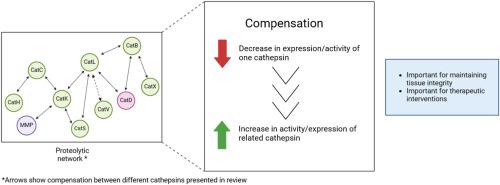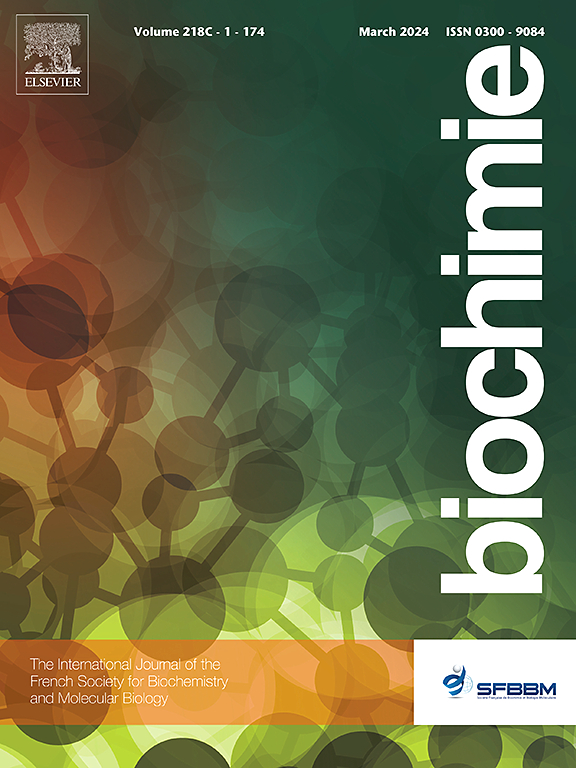蛋白酶之间的补偿作用。
IF 3.3
3区 生物学
Q2 BIOCHEMISTRY & MOLECULAR BIOLOGY
引用次数: 0
摘要
蛋白酶是溶酶体肽酶的一个家族,通过调节蛋白质的周转和降解以及许多对细胞正常功能和人体健康非常重要的特定调节作用,在维持细胞稳态方面发挥着至关重要的作用。在癌症、炎症、神经退行性疾病、骨重塑相关疾病等许多疾病中都观察到了酪蛋白酶活性和表达的变化。这些变化并不完全是有害的,而似乎是缺乏一种酪蛋白以维持组织完整性的代偿反应。特定胰蛋白酶的上调是对其他胰蛋白酶被抑制或功能失调的反应,这表明存在一个微调的蛋白水解平衡系统,了解胰蛋白酶的代偿作用可提高胰蛋白酶抑制剂的治疗潜力。选择性地针对一种酪蛋白或调节其活性可为多种疾病提供新的治疗策略。这篇综述强调了对疾病背景下的噬蛋白酶生物学进行全面研究的必要性。确定参与代偿反应的特定胰蛋白酶、阐明潜在的分子机制和开发有针对性的干预措施,可带来创新的治疗方法。本文章由计算机程序翻译,如有差异,请以英文原文为准。


Compensational role between cathepsins
Cathepsins, a family of lysosomal peptidases, play a crucial role in maintaining cellular homeostasis by regulating protein turnover and degradation as well as many specific regulatory actions that are important for proper cell function and human health. Alterations in the activity and expression of cathepsins have been observed in many diseases such as cancer, inflammation, neurodegenerative disorders, bone remodelling-related conditions and others. These changes are not exclusively harmful, but rather appear to be a compensatory response on the lack of one cathepsin in order to maintain tissue integrity. The upregulation of specific cathepsins in response to the inhibition or dysfunction of other cathepsins suggests a fine-tuned system of proteolytic balance and understanding the compensatory role of cathepsins may improve therapeutic potential of cathepsin's inhibitors. Selectively targeting one cathepsin or modulating their activity could offer new treatment strategies for a number of diseases. This review emphasises the need for comprehensive research into cathepsin biology in the context of disease. The identification of the specific cathepsins involved in compensatory responses, the elucidation of the underlying molecular mechanisms and the development of targeted interventions could lead to innovative therapeutic approaches.
求助全文
通过发布文献求助,成功后即可免费获取论文全文。
去求助
来源期刊

Biochimie
生物-生化与分子生物学
CiteScore
7.20
自引率
2.60%
发文量
219
审稿时长
40 days
期刊介绍:
Biochimie publishes original research articles, short communications, review articles, graphical reviews, mini-reviews, and hypotheses in the broad areas of biology, including biochemistry, enzymology, molecular and cell biology, metabolic regulation, genetics, immunology, microbiology, structural biology, genomics, proteomics, and molecular mechanisms of disease. Biochimie publishes exclusively in English.
Articles are subject to peer review, and must satisfy the requirements of originality, high scientific integrity and general interest to a broad range of readers. Submissions that are judged to be of sound scientific and technical quality but do not fully satisfy the requirements for publication in Biochimie may benefit from a transfer service to a more suitable journal within the same subject area.
 求助内容:
求助内容: 应助结果提醒方式:
应助结果提醒方式:


